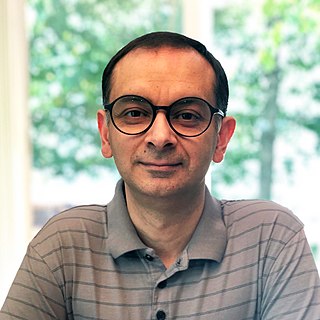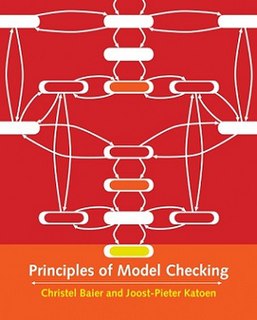External links
- Formalization and theory behind the model
- Reachability Analysis of Lazy Linear Hybrid Automata Research
Lazy linear hybrid automata model the discrete time behavior of control systems containing finite-precision sensors and actuators interacting with their environment under bounded inertial delays. The model permits only linear flow constraints but the invariants and guards can be any computable function.
This computational model was proposed by Manindra Agrawal and P. S. Thiagarajan.[ citation needed ] This model is more realistic and also computationally amenable than the currently popular modeling paradigm of linear hybrid automaton.[ citation needed ]

A finite-state machine (FSM) or finite-state automaton, finite automaton, or simply a state machine, is a mathematical model of computation. It is an abstract machine that can be in exactly one of a finite number of states at any given time. The FSM can change from one state to another in response to some inputs; the change from one state to another is called a transition. An FSM is defined by a list of its states, its initial state, and the inputs that trigger each transition. Finite-state machines are of two types—deterministic finite-state machines and non-deterministic finite-state machines. A deterministic finite-state machine can be constructed equivalent to any non-deterministic one.

In theoretical computer science and mathematics, the theory of computation is the branch that deals with what problems can be solved on a model of computation, using an algorithm, how efficiently they can be solved or to what degree. The field is divided into three major branches: automata theory and formal languages, computability theory, and computational complexity theory, which are linked by the question: "What are the fundamental capabilities and limitations of computers?".

A cellular automaton is a discrete model of computation studied in automata theory. Cellular automata are also called cellular spaces, tessellation automata, homogeneous structures, cellular structures, tessellation structures, and iterative arrays. Cellular automata have found application in various areas, including physics, theoretical biology and microstructure modeling.
In computational complexity theory, EXPSPACE is the set of all decision problems solvable by a deterministic Turing machine in exponential space, i.e., in space, where is a polynomial function of . Some authors restrict to be a linear function, but most authors instead call the resulting class ESPACE. If we use a nondeterministic machine instead, we get the class NEXPSPACE, which is equal to EXPSPACE by Savitch's theorem.

Automata theory is the study of abstract machines and automata, as well as the computational problems that can be solved using them. It is a theory in theoretical computer science. The word automata comes from the Greek word αὐτόματος, which means "self-acting, self-willed, self-moving". An automaton is an abstract self-propelled computing device which follows a predetermined sequence of operations automatically. An automaton with a finite number of states is called a Finite Automaton (FA) or Finite-State Machine (FSM).
In the context of hardware and software systems, formal verification is the act of proving or disproving the correctness of intended algorithms underlying a system with respect to a certain formal specification or property, using formal methods of mathematics.
A hybrid system is a dynamical system that exhibits both continuous and discrete dynamic behavior – a system that can both flow and jump. Often, the term "hybrid dynamical system" is used, to distinguish over hybrid systems such as those that combine neural nets and fuzzy logic, or electrical and mechanical drivelines. A hybrid system has the benefit of encompassing a larger class of systems within its structure, allowing for more flexibility in modeling dynamic phenomena.

In the theory of computation, a branch of theoretical computer science, a deterministic finite automaton (DFA)—also known as deterministic finite acceptor (DFA), deterministic finite-state machine (DFSM), or deterministic finite-state automaton (DFSA)—is a finite-state machine that accepts or rejects a given string of symbols, by running through a state sequence uniquely determined by the string. Deterministic refers to the uniqueness of the computation run. In search of the simplest models to capture finite-state machines, Warren McCulloch and Walter Pitts were among the first researchers to introduce a concept similar to finite automata in 1943.

Computational sociology is a branch of sociology that uses computationally intensive methods to analyze and model social phenomena. Using computer simulations, artificial intelligence, complex statistical methods, and analytic approaches like social network analysis, computational sociology develops and tests theories of complex social processes through bottom-up modeling of social interactions.
Computational science, also known as scientific computing or scientific computation (SC), is a rapidly growing field that uses advanced computing capabilities to understand and solve complex problems. It is an area of science that spans many disciplines, but at its core, it involves the development of models and simulations to understand natural systems.
In computer science, and more specifically in computability theory and computational complexity theory, a model of computation is a model which describes how an output of a mathematical function is computed given an input. A model describes how units of computations, memories, and communications are organized. The computational complexity of an algorithm can be measured given a model of computation. Using a model allows studying the performance of algorithms independently of the variations that are specific to particular implementations and specific technology.
In computer science, a linear bounded automaton is a restricted form of Turing machine.
In automata theory, a hybrid automaton is a mathematical model for precisely describing systems in which digital computational processes interact with analog physical processes. A hybrid automaton is a finite state machine with a finite set of continuous variables whose values are described by a set of ordinary differential equations. This combined specification of discrete and continuous behaviors enables dynamic systems that comprise both digital and analog components to be modeled and analyzed.
Indexed languages are a class of formal languages discovered by Alfred Aho; they are described by indexed grammars and can be recognized by nested stack automata.
A quantum cellular automaton (QCA) is an abstract model of quantum computation, devised in analogy to conventional models of cellular automata introduced by John von Neumann. The same name may also refer to quantum dot cellular automata, which are a proposed physical implementation of "classical" cellular automata by exploiting quantum mechanical phenomena. QCA have attracted a lot of attention as a result of its extremely small feature size and its ultra-low power consumption, making it one candidate for replacing CMOS technology.
A read-only Turing machine or two-way deterministic finite-state automaton (2DFA) is class of models of computability that behave like a standard Turing machine and can move in both directions across input, except cannot write to its input tape. The machine in its bare form is equivalent to a deterministic finite automaton in computational power, and therefore can only parse a regular language.
Configuration graphs are a theoretical tool used in computational complexity theory to prove a relation between graph reachability and complexity classes.

Reachability is a fundamental problem that appears in several different contexts: finite- and infinite-state concurrent systems, computational models like cellular automata and Petri nets, program analysis, discrete and continuous systems, time critical systems, hybrid systems, rewriting systems, probabilistic and parametric systems, and open systems modelled as games.

Gaurav Khanna is an Indian-American black hole physicist, supercomputing innovator, academic and researcher. He is a Professor of Physics, and Director of Research Computing at University of Rhode Island.

Principles of Model Checking is a textbook on model checking, an area of computer science that automates the problem of determining if a machine meets specification requirements. It was written by Christel Baier and Joost-Pieter Katoen, and published in 2008 by MIT Press.